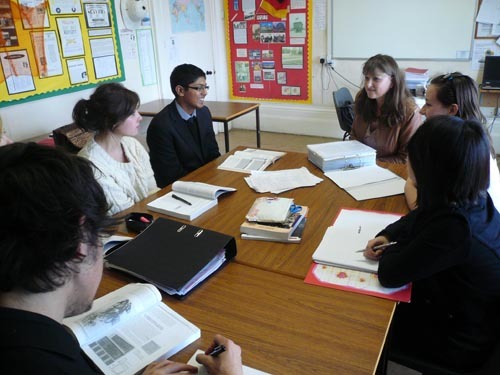
According to a report from the Alliance for Excellent Education, teacher attrition costs the United States up to $2.2 millones de dólares anuales. Roughly half a million U.S. teachers either move or leave the profession each year, and tragically, this serious problem disproportionately affects high-poverty schools.
It’s essential that we keep every teacher we get. Yet classroom teaching is arguably the most stressful job there is. Somewhere between 40 y 50 percent of those that go into teaching are gone within five years. Teachers matter, and if we are to have excellent teachers, we not only have to focus on recruiting qualified candidates but also creating an environment in which they can flourish.
In pursuit of solutions to the problem, La Búsqueda Global para la Educación asked our Top Global Teacher Bloggers this month: What are the top ten ways that administrators can help new teachers avoid burning out?
Adam Steiner (steineredtech) discusses in his blog the kind of pressure that teachers feel because of the political pressure put on schools to perform. Improving schools is called the “responsabilidad” approach where teachers are held directly responsible for the numerical scores of their students on a single annual test. Adam says, “La implacable campaña hacia resultados en los exámenes ha dejado a los profesores que sienten una presión palpable para mostrar el progreso del estudiante por encima de todo – and the price that is paid is in student social emotional health and a passion for lifelong learning. Evidence of this over-emphasis on data is in student stress surveys that show that students are overwhelmed with expectations and workload. If students are burned out, their teachers won’t be far behind.” Leer más.
Paulina Hawkins (PaulineDHawkins) points out that the key to retaining teachers is in the social relations between both the administration and other teachers. New teachers should be paired up with master teachers in a mentor/mentee relationship. New teachers require a whole network of support so that they feel like part of a team. New teachers should be allowed to “concentrate more on building relationships with students rather than on producing flawless curriculum.” Principals should do more than just dole out orders, they should be made to listen to and build rapport with every new teacher. Leer más.
Las expectativas deben ser alineados con la experiencia. Vicki Davis (coolcatteacher) dice, “new teachers are given hard jobs that no one wants. When you give a new teacher too much or too difficult of a task, you’re setting them up for failure.” She points to not only curriculum overload but to the central problem that every first year teacher faces: disciplina. Keeping students on track and focused with their work is unlike any job in the world. Leer más.
Balance is something that new teachers have a hard time finding. Sometimes it can feel like school is their whole world and that can be terribly overwhelming. Craig Kemp (mrkempnz) suggests that teachers must be allowed to have time for self-care. They should still be able to play sports, listen to music, or go running. Craig points to staff drinks and social gatherings as being essential to a healthy education culture. Teachers should be encouraged to associate outside the classroom. Leer más.
Education has a distinct culture that is different from the rest of the work world. Todd Finley (finleyt) suggests that because of this, “every school has norms of which new faculty might be unaware. Therefore strong mentoring colleagues are critical. A good first meeting would involve discussing a fact sheet of 20 things that might not be obvious to rookies.” Transparency is key for keeping new teachers. A checklist should be made for less visible procedures so that there are no surprises for new teachers. Expectations should be made upfront and totally clear if new teachers are expected to meet them. Leer más.
Richard Wells (@EduWells) indicates that first year teachers should not be made to bite off more than they can chew. Él dice: “Don’t add to the burden by giving new teachers a wide scope of courses or topics to get to grips with. Keep the initial focus on a narrower curriculum demand. Let them build confidence in a small amount before taking on the full job.” He also points out the double benefit of team-teaching: it relieves some of the pressure put on new teachers as well as provides a time-efficient source of professional development. Leer más.
La Búsqueda Global para la Educación would like to thank our Top Global Teacher Bloggers for sharing their insightful perspectives.
Tom Bennett (@ Tombennett71), Joe Bower (joe_bower), Susan Bowles (FloridaKteacher), Lisa Currie (RippleKindness), Vicki Davis (coolcatteacher), Todd Finley (finleyt), Paulina Hawkins (PaulineDHawkins), Craig Kemp (mrkempnz), Karen Lirenman (KLirenman), Adam Steiner (steineredtech), Silvia Tolisano (langwitches) y Richard Wells (@EduWells) son La Búsqueda Global para la Educación 2014 Top 12 Global bloggers Maestro. In Memoriam Joe Bower (joe_bower).

Lead photo courtesy of Shutterstock.com
Únete a mí y reconocidos a nivel mundial los líderes de opinión, incluyendo a Sir Michael Barber (Reino Unido), DR. Michael Bloquear (EE.UU.), DR. Leon Botstein (EE.UU.), Profesor Clay Christensen (EE.UU.), DR. Linda Darling-Hammond (EE.UU.), DR. MadhavChavan (India), El profesor Michael Fullan (Canada), El profesor Howard Gardner (EE.UU.), El profesor Andy Hargreaves (EE.UU.), Profesor Yvonne Hellman (Países Bajos), Profesor Kristin Helstad (Noruega), Jean Hendrickson (EE.UU.), Profesor Rose Hipkins (Nueva Zelanda), Profesor Cornelia Hoogland (Canada), Honorable Jeff Johnson (Canada), Señora. Chantal Kaufmann (Bélgica), DR. EijaKauppinen (Finlandia), Secretario TapioKosunen Estado (Finlandia), Profesor Dominique Lafontaine (Bélgica), El profesor Hugh Lauder (Reino Unido), Señor Ken Macdonald (Reino Unido), Profesor Geoff Masters (Australia), Profesor Barry McGaw (Australia), Shiv Nadar (India), Profesor R. Natarajan (India), DR. PAK NG (Singapur), DR. Denise Papa (Estados Unidos), Sridhar Rajagopalan (India), DR. Diane Ravitch (EE.UU.), Richard Wilson Riley (EE.UU.), Sir Ken Robinson (Reino Unido), Profesor Pasi Sahlberg (Finlandia), El profesor Manabu Sato (Japón), Andreas Schleicher (PISA, OCDE), DR. Anthony Seldon (Reino Unido), DR. David Shaffer (EE.UU.), DR. Kirsten Immersive Are (Noruega), Canciller Stephen Spahn (EE.UU.), Yves Theze (LyceeFrancais EE.UU.), Profesor Charles Ungerleider (Canada), Profesor Tony Wagner (EE.UU.), Sir David Watson (Reino Unido), Profesor Dylan Wiliam (Reino Unido), DR. Marcos Wormald (Reino Unido), Profesor Theo Wubbels (Países Bajos), El profesor Michael Young (Reino Unido), y el profesor Zhang Minxuan (De China) a medida que exploran las cuestiones de educación cuadro grande que todas las naciones se enfrentan hoy.
La Búsqueda Global para la Educación Comunitaria Página
C. M. Rubin es el autor de dos ampliamente leído serie en línea por la que recibió un 2011 Premio Upton Sinclair, “La Búsqueda Global para la Educación” y “¿Cómo vamos a Leer?” Ella es también el autor de tres libros más vendidos, Incluido The Real Alice in Wonderland, es el editor de CMRubinWorld, y es una Fundación Disruptor Fellow.
Siga C. M. Rubin en Twitter: www.twitter.com/@cmrubinworld






Comentarios recientes